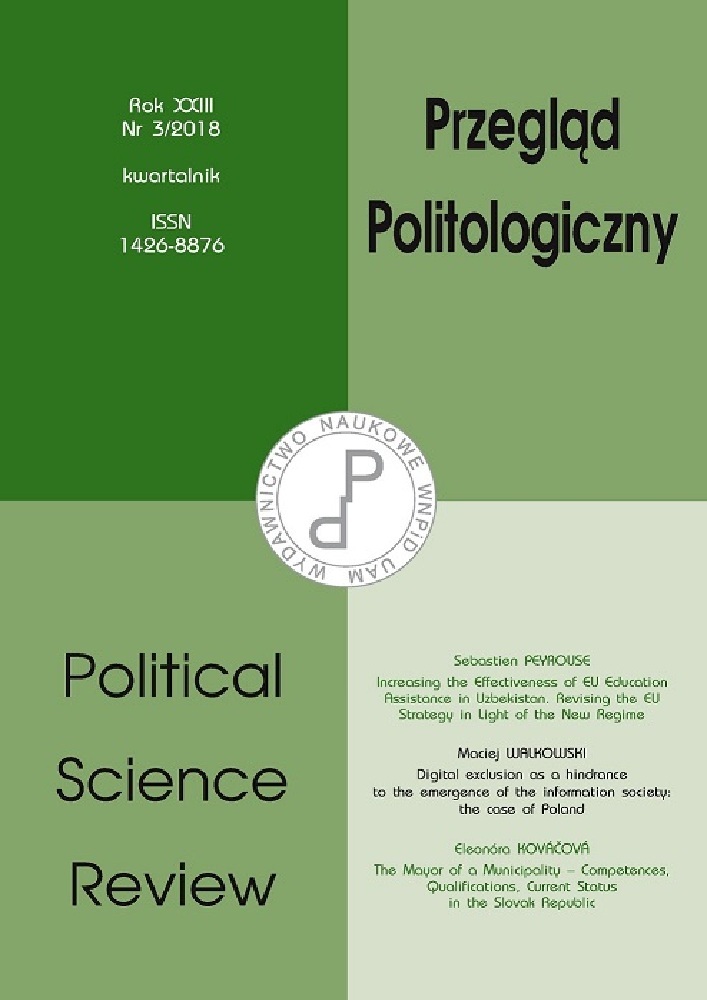Abstract
The mandatory authorities – the municipal office and the mayor of the municipality – play an irreplaceable role at the municipal level. Both bodies are elected. These authorities influence the direction of municipal development in the upcoming term of office, the municipal representatives’ protection of citizens’ needs and interests as well as fulfilment of the tasks and obligations imposed by the law. The main aim of the article is to clarify the importance and seriousness of the mayor as the highest representative of the municipal government in the Slovak Republic. Another aim is to present new realities connected with the mayor’s office as well as new requirements associated with it.
References
Before the municipal elections (Pred komunálnymi voľbami). Theme of the week – Session of the TV Hronka, 26 September 2014, http://www.tvhronka.sk/relacie/tema-tyzdna/tema-tyzdna-predkomunalnymi-volbami/.
Dahl R. A., Tufte E. R. (1973), Size and Democracy, Stanford University Press, Stanford.
Gašpar M. (1993), Moderná verejná správa, PROCOM, Bratislava.
Jones P., Hudson J. (1998), The role of political parties: An analysis based on transaction costs, “Public Choice,” 94(1–2), pp. 175–189.
Koper J. (2003), Mechanizmy vzniku moderného politického systému, Bratia Sabovci, s. r. o., Zvolen.
Kováčik B. (2009), Sloboda, demokracia a participácia v kontexte moderných teoretických prístupov novej ľavice a novej pravice, “Politické vedy,” 12(3), pp. 145–153.
Kováčová E. (2012), Regionalne samorządy w Republice Słowacji, in: Młoda Politologia: quo vadis, Polsko?, Quo vadis, europejska demokracjo?, III Świętokrzyskie Spotkania Naukowe, Instytut Nauk Politycznych Uniwersytetu Jana Kochanowskiego, Kielce, pp. 33 44.
Kováčová E. (2014), Teória a prax verejnej správy v podmienkach Slovenskej republiky, Belianum, FPVaMV UMB, Banská Bystrica.
Kováčová E. (2014a), The educated self-government as a basic pre-conditions for the quality service for the citizen, in: Hradecké ekonomické dny 2014. Ekonomický rozvoj a management regionů, Gaudeamus, Hradec Králové, pp. 48–56.
Kováčová E. (2015), The system of public administration in the Slovak Republic, Belianum, FPVaMV UMB, Banská Bystrica.
Kováčová E. (2016), Elections to the bodies of the local self-administration of the Slovak Republic, “Auspicia,” VŠEaRS České Budějovice, 13(1), pp. 19–36, http://vsers.cz/wp-content/uploads/2016/06/Auspicia-1-2016.pdf.
Kováčová S., Masár D. (2013), Otázka legislatívneho vymedzenia minimálneho stupňa vzdelania ako podmienky pre výkon funkcie hlavy obce – starostu, “Interpolis ‘13: zborník vedeckých prác,” FPVaMV UMB, Banská Bystrica, pp. 351–355.
Kulašik P. (2002), Úvod do politológie, FPVaMV UMB, Banská Bystrica.
Liptáková K., Krnáč J. (2016), Some aspects of communal self-governments’ elections, “Progress in Economic Sciences” [online], no. 3, Rocznik Naukowy Instytutu Ekonomicznego Państwowej Wyższej Szkoły Zawodowej im. Stanisława Staszica w Pile, pp. 75 84.
Maškarinec P., Klimovský D. (2016), Independent Candidates in the Local Elections of 2014 in the Czech Republic and Slovakia: Analysis of Determinants of Their Successfulness, “Lex Localis – Journal of Local Self-Government,” 14 (4), pp. 827–851.
Mesíková E. (2010), Lokalny samorząd jako integralna część administracji w Republice Słowacji, in: Młode demokracje: 20 lat transformacji systemowej w Europie Środkowej 1989–2009, Instytut Nauk Politycznych Uniwersytetu Jana Kochanowskiego, Kielce, pp. 93–108.
New municipal elections 2014–2018 [Nové voľby do orgánov samosprávy obcí 2014–2018], 15 August 2016, Statistical Office of the Slovak Republic, http://volby.statistics.sk/oso/doplnkove2014/sk/.
Palúš I. (2002), Štátne právo porovnávacie, UPJŠ Košice, Košice.
Part of the Opposition attacks the educational census of mayors [Časť opozície napadne vzdelanostný cenzus starostov], 3 July 2014, http://spravy.pravda.sk/domace/clanok/322836-cast-opozicienapadne-vzdelanostny-cenzus-pre-starostov/.
The Act of the Slovak National Council No. 369/1990 Coll. on the Establishment of Municipalities as amended by later regulations.
The Act of the National Council of the Slovak Republic No. 102/2010 Coll., which amends the Act of the Slovak National Council No. 369/1990 Coll. on the Establishment of Municipalities as amended by later regulations.
The Act of the National Council of the Slovak Republic No. 180/2014 Coll. on Conditions of the Exercise of Voting Rights as amended by later regulations.
The Act of the National Council of the Slovak Republic No. 70/2018 Coll., which amends the Act of the Slovak National Council No. 369/1990 Coll. on the Establishment of Municipalities as amended by later regulations.
The Constitution of the Slovak Republic.
The educational census for mayors (Vzdelanostný cenzus pre starostov a primátorov), From first Hand – Session of the RTVS, 12 September 2014, http://www.rtvs.sk/radio/archiv/1175/49753.
The European Charter of Local Self-Government.
The future of the municipal government – a communal reform (Budúcnosť miestnej samosprávy – komunálna reforma). From first Hand – Session of the RTVS, 14 October 2014, http://www.rtvs.sk/radio/archiv/1175/63265.
The Mayor just high school graduated? [Starosta len s vysvedčením zo strednej školy?], 29 May 2014, http://spravy.pravda.sk/domace/clanok/319197-starosta-len-s-vysvedcenim-zo-strednej-skoly/.
The Mayor with no nedd of a high school diploma [Na starostu maturitu zatiaľ netreba], 10 September 2014, http://spravy.pravda.sk/komunalne-volby-2014/clanok/329491-sud-pozastavil-ucinnostzakona-ze-starosta-musi-mat-strednu-skolu/.
Toonen T. A. J. (1998), Networks, management and institutions: Public administration as, “Normal Science,” Public Administration, 76 (2), pp. 229–252.
Tóth R. (1998), Koncepcia politického systému, Úrad pre stratégiu rozvoja spoločnosti, vedy a techniky Slovenskej republiky, Bratislava.

